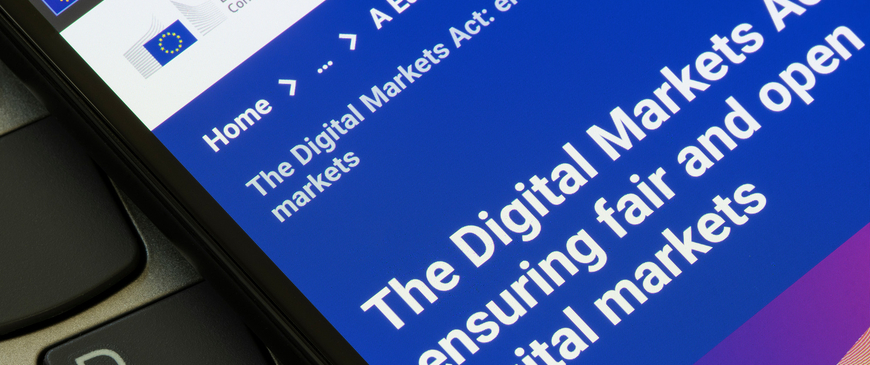
Will Europe's DMA promote gatekeeper competition?
The Digital Markets Act aims to level tech’s uneven playing field. This goal requires not just reining in the largest tech companies but encouraging them to compete against each other.
Lawmakers hoped the DMA would make digital markets “contestable” and “fair” by helping digital Davids compete against Goliath gatekeepers. But one of the main problems with digital competition — and one which warrants regulatory intervention — is that the Goliaths may too often avoid competing against each other. In some cases, the DMA may actually make this type of competition less likely.
Regulators are trying their best to promote big company competition. Despite the law’s inflexible criteria to determine DMA gatekeepers based on size and turnover, European regulators enjoy some discretion. The European Commission has used that leeway to avoid regulating some “challenger brands” launched by big tech firms, such as Microsoft’s Edge web browser and its Bing search engine. After the DMA goes into effect, Microsoft will continue to be able to encourage Windows users to try Bing and Edge, probably the only way they can ever gain enough traction to compete with Google’s market leading Search and Chrome.
Small firms will be disappointed. They hoped the DMA would impose a ‘level playing field’ and might have gained visibility if Microsoft was forced to present a choice of browsers and search engines. But the Commission’s approach values realistic competition — even from a megafirm like Microsoft — over a rigid insistence on all large tech firms following the same rules.
In other cases, however, the DMA is proving to be a straitjacket. Once a platform provided by a large tech firm has enough users for three years, for example, it can only escape regulation in “exceptional” cases. In other words, the Commission often has to regulate a service even if its competitors are large. The Commission, for example, felt compelled to regulate Apple’s Safari web browser, even though Google Chrome enjoys a much larger market share. Apple will now have to present users with a choice of web browsers.
Although some stakeholders may see the browser choice screen as a fair outcome to help ensure users understand that they have a choice, the screen could encourage iPhone users to switch to Google Chrome — an outcome most lawmakers are unlikely to have intended, since it would make the most-used web browser even more popular. Similar problems apply to TikTok and Facebook Marketplace, both of which will be regulated even though are challengers. In both cases, however, the companies are appealing.
Where to draw the line between encouraging consumer choice and encouraging gatekeeper competition is tricky. In some cases, the DMA’s objectives are straightforward and will benefit both big tech firms that want to be disruptive and consumers. Forcing Apple and Google to open their mobile operating systems, for example, makes sense in that context, Apple and Google limit users’ ability to find apps outside their own app stores. Users are unlikely to swap between iPhone and Android if they are unhappy with the app ecosystem, since switching involves buying a new phone and migrating apps, settings, and files. Apple’s and Google’s approach in areas such as fees are similar anyway — meaning there is little point to switching.
Although serious practical questions remain about how to implement these new app store rules while keeping users safe, competition and innovation should, in theory, improve if consumers have additional avenues to access apps. Large tech firms like Microsoft will benefit most — since its app stores will be trusted by consumers, and it should be able to maintain high cybersecurity standards — but all app developers could benefit by having additional places to sell their apps.
In other cases, though, DMA rules make competition between large firms harder, not easier. Take the requirement that Google avoid favoring its own services in its search results. Manipulating search results can drive competitors out of the market, as the Commission alleged occurred in the Google Shopping case. But a rule preventing all self-preferencing in search rankings is too broad. What if Google is trying to break into a market where there is currently only one other player, and the entry of a Google service offers the prospect of fresh competition? Google Docs, for example, competes against Microsoft’s much larger Office. Google also has tried multiple times to start a social network to compete with Facebook and Instagram. The DMA’s rules risk dissuading Google from trying to build such challengers in future, since it will be harder to encourage consumers to try them out.
Regulators so far have attempted to apply the DMA to promote competition and in ways that recognize that other large tech firms will often provide the stiffest challenge. The DMA may succeed in breaking some markets open. But the law’s rigid design limits how far they can go — and may result in some outcomes that make effective competition harder, not easier, to achieve.
Zach Meyers is assistant director of the Centre for European Reform, where he works on EU competition policy, particularly in the digital sector. Prior to joining the CER, he spent over 10 years as a competition and regulatory lawyer in Australia, the US, and the UK.
Several large technology companies, including Amazon, Apple, Google, Meta, and Microsoft, are corporate members of the Centre for European Reform.
